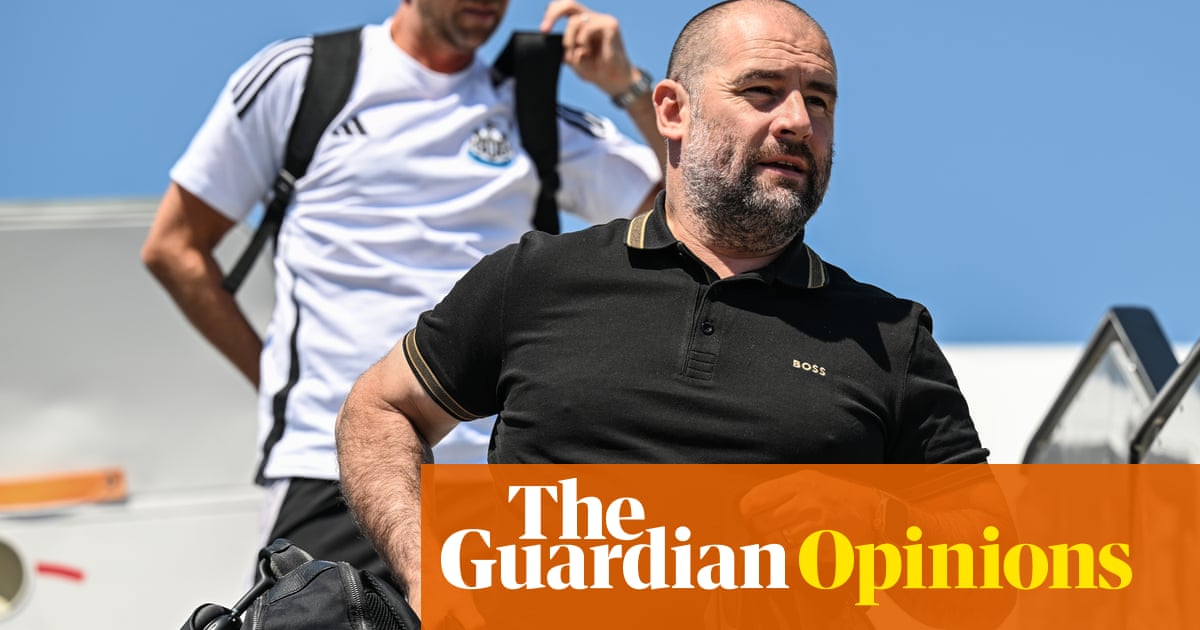The table was all wrong. In retrospect it offered the first clue that lack of emotional intelligence would prove central to Paul Mitchell’s undoing at Newcastle.
It was early last September when reporters were invited to St James’ Park to meet the club’s then newish sporting director. As Mitchell strode into the windowless Sir Bobby Robson suite and took his seat at the head of a very long rectangular table he neglected to notice that journalists at the opposite end were isolated from the conversation.
Sure enough, he was questioned so intensely by those clustered around him that others struggled to get a word in edgeways. While it took me more than an hour of a 90-minute briefing to seize a fleeting opportunity to ask a question, an adjacently seated colleague never managed to say a single word toDan Ashworth’s successor. Mitchell appeared oblivious.
Supporters might think: “So what?” But it appeared indicative of a wider carelessness that helps to explain whythe sporting director will be leaving Newcastleby “mutual consent” this month. The previous year Ashworth had conducted a similar exercise at the training ground. On walking into the media room the then soon-to-be Manchester United‑bound sporting director surveyed rows of formal seating, shook his head and began dragging chairs into a more inclusive circle. That way everyone felt equal and could easily participate. It was a common‑sense move that won hearts and minds.
Emotional intelligence is an unquantifiable yet imperative component in football’s high-stakes world of fragile egos and, sometimes, almost paranoid insecurity. Mitchell shortage of soft skills provoked a needless civil, and turf, war withEddie Howelast autumn. If failing to recognise the need for circular seating represented a mistake, his repeated reiteration that Newcastle’s ostensibly successful transfer policy was “not fit for purpose” proved incendiary. Given the manager demands a final say on signings and his nephew, Andy Howe, is a key figure in the recruitment department, it seemed arrogant macho posturing. Sadly this humility bypass would obscure the considerable good Mitchell has done on Tyneside, most notably appointing the injury-prevention specialist James Bunce.
It might have been different had Amanda Staveley and her husband, Mehrdad Ghodoussi, still been around as directors and minority owners to smooth the sporting director’s rough edges. Staveley is all about deal-making facilitated by emollient human connectivity. During the two and a half years she and Ghodoussi ran Newcastle on behalf of the majority owner, Saudi Arabia’s Public Investment Fund, a sense of harmony prevailed.
Yet since the couple wereforced out last summer– apparently for assorted reasons, including a confusing overlap with the role of the chief executive, Darren Eales – the club has seemed colder and more corporate. Stress levels have risen.
It did not help that Ashworth – admired by Howe for his humility and “if it ain’t broke, don’t fix it” approach that, paradoxically, would preface his swift Old Trafford downfall – had been persuaded the Mancunian grass was greener. Or that Eales, who had been diagnosed with blood cancer, announced he would depart once a successor was identified.
Sign up toFootball Daily
Kick off your evenings with the Guardian's take on the world of football
after newsletter promotion
With that moment drawing close, the chief executive and Mitchell, old friends from their Tottenham days, leave at a juncture when Howe operates from a position of maximum strength. After winning the Carabao Cup and securing a second Champions League qualification in three years, his fiercely protected power base looks bombproof.
The manager’s undeniable, if occasionally high‑maintenance, brilliance camouflages considerable behind‑the‑scenes turmoil at a club where the boardroom churn is hardly conducive to stability. While the available funds of about £100m need to be spent urgently yet intelligently on restocking Howe’s slender squad, Newcastle’s second‑tier women’s team have just released 12 players and confront a complicated crossroads.
PIF could do worse than replace Mitchell internally. The former Sunderland and Hibernian manager Jack Ross holds an MA in economics, has written two children’s books and is head of Newcastle’s strategic technical football partnerships. The former executive with the Scottish players’ union and the global FifPro is smart, nuanced and empathetic; he champions women’s football and, unlike his bosses, is an excellent communicator.
Counterproductively, communication between the media and the Saudis is nonexistent. Yasir al‑Rumayyan, Newcastle’s chair, has never spoken to reporters, let alone explained the ownership strategy or why potential moves to a new stadium and/or training ground remain pending. That might seem irrelevant to fans. Yet if, as is widely believed, purchasing the club was really all part of a sportswashing exercise intended to clean up the kingdom’s blood-stained image while bolstering its embryonic tourism industry, it is also distinctly odd.
Perhaps there is an acceptance that Saudi Arabia’s human rights record is so atrocious that awkward questions are best avoided, but maybe it’s simply a lack of empathy. Whatever the reason, the disconnect jars.
The lack of trust between Mitchell and Howe ultimately spelled divorce. When eventually I asked the former whether the manager’s instinctive wariness of outsiders meant winning his confidence was hard work, the reply – “You sound like you know him better than I do” – sounded only half-joking.
After that calamitous briefing the manager blanked the sporting director for a fortnight before Eales negotiated a truce that endured to the point where the announcement last Tuesday of Mitchell’s impending exit prompted mild surprise.
After all this, maybe the Saudis regret allowing the emotional intelligence embodied by Ashworth, now a senior Football Association executive, and Staveley to slip through their fingers.
